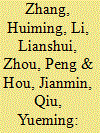|
|
|
Sort Order |
|
|
|
Items / Page
|
|
|
|
|
|
|
| Srl | Item |
| 1 |
ID:
112308


|
|
|
|
|
| Publication |
2012.
|
| Summary/Abstract |
Ireland recorded significant growth in energy-related carbon emissions from 1990 to 2007 as the country underwent rapid economic development. Using the LMDI decomposition analysis method, this paper aims to identify and analyse the driving forces of CO2 emissions in eleven final energy consuming sectors. This multi-sectoral analysis is based on four economic sectors, the residential sector and gives a detailed representation of transport in keeping with UNFCCC recommendations. Scale, structure and intensity effects are explored and substantial heterogeneity in sectoral performance is observed. Scale growth in economic and transport activity was considerable. Some improvements in energy intensity were recorded in the economic sectors. In transport, increases in intensity contributed to a significant increase in emissions, while energy intensity decreased in the residential sector. The declining emissions coefficient of electricity was important in limiting emissions but renewable energy has been slow to penetrate the demand side. The results have relevance in considering development paths and can aid in identifying policy measures required to address the key driving forces of emissions in the sectors. The rapid increase in transport emissions in particular raises concerns of future lock-in to a higher emissions trajectory.
|
|
|
|
|
|
|
|
|
|
|
|
|
|
|
|
| 2 |
ID:
192357


|
|
|
|
|
| Summary/Abstract |
This work sheds some light on the influence that entrepreneurs' previous work experiences exerted on the growth performance of Chinese private firms after the privatization reform in the early 2000s. Focusing on a representative and large sample of private firms, the analysis finds evidence of an inferior performance of the companies run by entrepreneurs with past top management experience in state-owned companies, while the superior performance of the companies run by entrepreneurs with prior technical experience. The study investigates specific theory-driven mechanisms through which different experiences impact firm performance, including time allocation and R&D management strategy. Upper echelon theory and imprinting effects appear relevant, and local institutions, political and economic uncertainty, and entrepreneurs' self-perception act as moderating factors. We deal with potential endogeneity issues with propensity score matching and two-stage least squares regression. These findings provide novel evidence on underexplored aspects of the ongoing privatization process in China and other economies in transition.
|
|
|
|
|
|
|
|
|
|
|
|
|
|
|
|
| 3 |
ID:
127227


|
|
|
|
|
| Publication |
2014.
|
| Summary/Abstract |
Many countries are concerned with the waste-to-energy for economic development and societal welfare. This paper constructs a dynamic game model that, for the first time compares the incentive effects of four common subsidy modes on waste cooking oil supply for biofuel refining and sales of waste cooking oil refined products. The model considers the impact of preferential tax treatment, a raw material subsidy, a sales subsidy and an investment subsidy on the profits of biofuel enterprises and waste cooking oil recyclers. Results indicate that common approaches adopted in developed economies such as raw material price subsidies and finished products sales subsidies increase the profits of both biofuel enterprises and recyclers. On the contrary, investment subsidies, which are relatively common in some regions of China, increase the profits of recyclers, while reducing revenues achieved by biofuel enterprises. To promote the supply chain, policy should give priority to raw material price subsidies and finished products sales subsidies, and for investment subsidies, however, the government should be cautious.
|
|
|
|
|
|
|
|
|
|
|
|
|
|
|
|
|
|
|
|
|